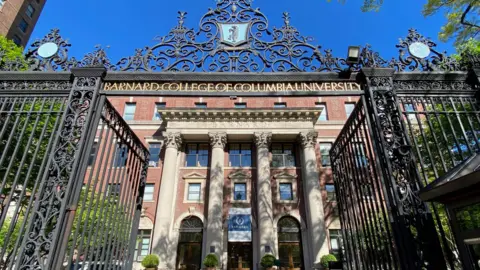Columbia University has reached a significant settlement with the Trump administration, agreeing to pay $200 million to the federal government. This agreement stems from accusations that the university failed to adequately protect its Jewish students amid rising antisemitism. The settlement, which will be disbursed over a span of three years, was formally announced in a statement issued by the university.
In return for this financial settlement, the federal government has consented to release a portion of the $400 million in federal grants that it had either frozen or terminated back in March. This resolution comes after a prolonged period of scrutiny directed toward Columbia, particularly following protests that erupted on its New York City campus last year in response to the Israel-Gaza conflict. As a result of these allegations, Columbia University had also previously accepted a set of demands from the White House earlier in the year.
Education Secretary Linda McMahon characterized the agreement with Columbia University as a “seismic shift” in the ongoing endeavor to hold universities accountable for their actions. The university’s acting president, Claire Shipman, expressed that this settlement represents a crucial advancement after a duration of steady federal evaluation and institutional instability. Columbia University finds itself among a wider group of educational institutions that have faced scrutiny from the Trump administration regarding various issues, particularly the protests relating to Israel’s military actions in Gaza, as well as policy matters surrounding transgender athletes and diversity, equity, and inclusion (DEI) programs.
Data provided by the Center for American Progress, a liberal think tank, indicates that over 4,000 federal grants have been targeted for termination across more than 600 universities and colleges, amounting to a staggering total of around $8 billion. In a statement posted on the Truth Social platform, Donald Trump lauded the agreement, indicating that Columbia has resolved to eliminate what he termed “ridiculous DEI policies” and to base student admissions strictly on merit. He suggested that numerous other higher education institutions, which he alleged had “wrongly spent federal money,” could be under similar scrutiny in the future.
The Trump administration had initially cut $400 million in federal funding from Columbia shortly after Trump took office, citing concerns over antisemitism. This action significantly threatened the university’s research capabilities, leading to claims of a “tipping point” from Ms. Shipman in June regarding the pressure being faced by Columbia. Following the government’s decision, Columbia was compelled to implement certain requested regulatory changes that included reorganizing its Middle Eastern studies department and onboarding a dedicated group of special officers with powers to remove students from campus and execute arrests.
As part of the financial settlement, a substantial number of the previously cancelled or paused grants will be reinstated. Notably, the agreement includes provisions for appointing an independent monitor to oversee the proper implementation of the accord. Several adjustments within the university have already been put into practice. These include disciplinary actions against students involved in protests on campus, the requirement for demonstrators to present campus ID, prohibiting face masks during protests, and enhancing oversight of student organizations, along with an expansion of campus security personnel.
Despite the significant concessions made in this settlement, Columbia University has declared that it is not an admission of guilt. Ms. Shipman reinforced that the settlement has been carefully designed to uphold the institution’s core values and to facilitate a productive relationship with the federal government moving forward. She emphasized that the terms of the settlement are intended to protect the university’s independence amid the challenges faced during this federal oversight phase.
Contrastingly, Harvard University has taken a definitive stand against the Trump administration. Despite also experiencing funding cuts and efforts to disrupt its enrollment of international students, Harvard has pursued legal action against the administration, marking a clear divergence in strategy between the two prestigious institutions.
In conclusion, Columbia University’s settlement with the Trump administration illustrates a pivotal moment in the ongoing discourse surrounding antisemitism on campus and federal oversight of educational institutions. As Columbia strives to navigate its future under scrutinizing eyes, the outcome of this agreement could serve as a template for other universities grappling with similar challenges within the landscape of higher education.












